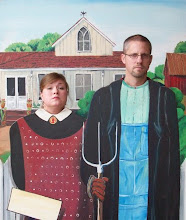Chapter 7 is a virtual encyclopedia on marriage. So many questions are answered in these verses. We find out the God-ordained place and purpose for sexual relations. We find instruction related to divorce and remarriage whether the spouse is a believer or an unbeliever. However, in the midst of all of this, Paul is making a point. His main point here is that if you can live your life without needing to enter into marriage, then you will be more useful for the Kingdom of God. He also points out that this ability to remain single and satisfied is truly a gift (vs7). This is a gift that I do not have! It is true, though, that those who remain single have the opportunity to pour more of their time and energy into service for God. In light of all this, however, Paul continues to point out that marriage is not something to be avoided (vs2,9,28,36,38,39).
Paul makes another interesting point in the middle of this chapter (vs17-24). His point here is to remain in the same state you were in when you came to know Christ as your Savior. I think what we can gain from this is that God calls to Himself different types of people in different types of situations in order that His Kingdom work can be carried out by diverse people in diverse ways to bring about even more glory to God. Another way that you could say it this, "Bloom where you're planted." Bear fruit in the situation that God has called you in and seek His glory, not your own advancement!
Chapter 8 introduces the concept of the "weaker brother." This "weak" brother is one who does not have all of the knowledge necessary to inform his conscience properly. Paul's exhortation here is not to the weaker brother to be strengthened, but rather to the knowledgeable brothers to be considerate of the weak. One of his main reasons for this consideration is that Jesus Christ died for these "weak" brothers, therefore to sin against one of them is to sin against Christ (vs11-12). This certainly "ups the ante" as we try to live in consideration of one another. In the midst of his explanation, Paul makes some very significant statements in vs6--namely, we exist for God and we exist as Christians through Jesus Christ. These two statements do a wonderful job in orienting ourselves to our place in the world and the Church. We exist, not for ourselves, but for God. Life is about Him, not about us! Further, we came into being as Christians, not through our own power or initiative, but rather through the power and initiative of Jesus Christ. These two concepts are truly foundational to the successful living of the Christian life!
In chapter 9, Paul details his rights as a minister of the gospel. Again, here there are many statements made by Paul that are instructive to the people of God as to how they should provide for their ministers. But, Paul does not include this to press upon the Corinthians in order to exercise his rights, but rather for them to understand what he is not exercising, though he does have the right to do so. In other words, Paul is surrendering his rights so that he might have a fruitful ministry among these people. How counter-cultural this thought is today in our culture of "i-must-have-my-rights"! It is in this context that Paul states that he becomes "all things to all people, that by all means I might save some" (vs22). What is ironic about this is that so many people use this verse to expand their rights in their attempt to reach out to people. They would say that they have a right to do things that others might have a problem with because they are doing it in the name of reaching diverse groups of people. This is in fact the direct opposite of what Paul was saying in this passage. Paul's becoming "all things to all men" manifested itself in Paul's restraining himself from things that he had a right to do. Isn't it amazing what happens when one considers the context of certain "proof-texts"?
Paul closes this chapter with a well-known passage on persistent, self-controlled striving in the the ministry (vs24-27). What a wonderful example Paul is to those of us who would serve the church faithfully!
Thursday, November 5, 2009
Subscribe to:
Post Comments (Atom)

No comments:
Post a Comment